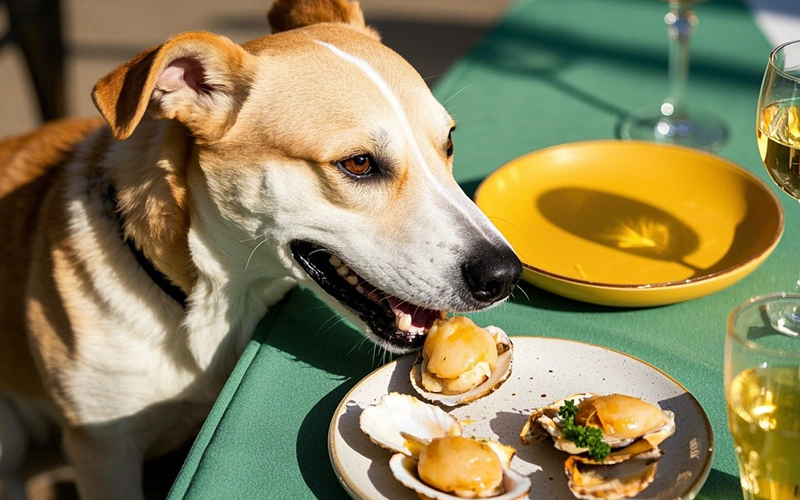Can Dogs Eat Scallops? A Guide to Feeding Scallops Safely to Your Dog
- 24 Mar 2025 14:16
Scallops are a type of shellfish that many people enjoy for their delicate flavor and nutritional benefits. But when it comes to feeding them to your dog, is it safe? 🐚 The answer is yes, dogs can eat scallops, but there are some important considerations to keep in mind to ensure that they’re a healthy treat for your furry friend. Let’s dive into the details! 🐕

Benefits of Scallops for Dogs
Scallops can actually be a healthy source of protein and other essential nutrients for dogs when prepared properly. Here are some of the benefits:
High in Protein: Scallops are rich in lean protein, which is great for building and repairing muscles and tissues in dogs.
Low in Fat: Unlike some meats, scallops are relatively low in fat, making them a suitable treat for dogs that are on a low-fat or weight-management diet. 🐾
Rich in Vitamins and Minerals: Scallops are packed with important nutrients like vitamin B12, selenium, zinc, and iron, which help support your dog’s immune system, energy levels, and overall health. 🧑⚕️
Risks of Feeding Scallops to Dogs
While scallops can be a nutritious snack for your dog, there are some important things to keep in mind to avoid potential risks:
1. Allergies or Sensitivities
Just like with other types of seafood, some dogs may be allergic to scallops. If you’re introducing scallops to your dog for the first time, start with a small amount and watch for signs of allergic reactions, such as itching, swelling, vomiting, or diarrhea. 🚨
2. Cooking Method Matters
Never feed raw scallops to your dog. Raw shellfish can carry harmful bacteria or parasites, such as vibrio or norovirus, which can cause food poisoning. Always cook the scallops thoroughly before serving them to your dog. Grilling, baking, or steaming are great options. Avoid seasonings, butter, or garlic, as these can be toxic to dogs. 🔥
3. Choking Hazard
Scallops are often served in their shells, which can pose a choking hazard for dogs. Make sure to remove the shell completely before offering scallops to your dog, and cut the scallops into small, bite-sized pieces, especially for smaller dogs. 🦴
4. High Sodium Content
Some prepared or canned scallops may be high in sodium or preservatives, which can be harmful to dogs if consumed in excess. Always choose fresh, unseasoned scallops and avoid feeding your dog scallops from cans or packaged versions that may contain added salt or chemicals. 🧂
How to Safely Feed Scallops to Your Dog
If you decide to treat your dog to some scallops, here’s how to do it safely:
1. Cook the Scallops Thoroughly
Always cook the scallops to eliminate any harmful bacteria or parasites. Boiling, steaming, or grilling them without any added seasonings or oils is the best way to prepare them.
2. Remove the Shells
Ensure that the scallops are free of their shells before offering them to your dog. The shells can be a choking hazard and may cause digestive issues if swallowed.
3. Serve in Moderation
While scallops are a great source of protein, they should only be served in moderation. Too many shellfish can lead to an upset stomach, or worse, digestive distress. A small piece of scallop every now and then is plenty!
4. Monitor for Allergic Reactions
As with any new food, introduce scallops slowly and keep an eye out for any adverse reactions, such as vomiting, diarrhea, or swelling. If your dog experiences any of these symptoms, stop feeding them scallops and consult a pet health professional.
Signs of an Allergic Reaction to Scallops
If your dog shows signs of an allergic reaction after eating scallops, it’s important to act quickly:
Itching or skin irritation
Swelling around the face or throat
Vomiting or diarrhea
Difficulty breathing
If you notice any of these symptoms, seek veterinary attention immediately. You can also consult PettureX for a 24-hour online consultation and quick advice. 📱
The Bottom Line: Can Dogs Eat Scallops?
Yes, dogs can eat scallops, but only when they are properly cooked, free from shells, and served in moderation. Scallops can provide a healthy protein boost and important nutrients for your dog, but you should avoid giving them too much at once and always check for signs of food allergies. 🐕💚
For ongoing support, PettureX offers 24-hour consultations and pet image recognition, so you can get professional advice anytime you have concerns about your dog’s health. 🐾
Treat your dog to a small serving of scallops now and then, and they can enjoy the nutritional benefits without the risks! 🌟
Related

Crunchy Curiosity: Can Dogs Safely Snack on Pork Rinds? A Deep Dive
- 21 Apr 2025
Pomegranate Seeds and Pooches: A Deep Dive into Whether Dogs Can Safely Indulge
- 21 Apr 2025
Can Dogs Eat Peaches? Vet Explains Benefits, Cyanide Risks & Safe Serving
- 16 Apr 2025
Can Dogs Eat Mulberries? Vet Explains Safety, Benefits & Potential Risks
- 16 Apr 2025
Can Dogs Eat Mozzarella? Vet Explains the Cheesy Truth (Risks & Benefits)
- 16 Apr 2025
Can Dogs Eat Maple Syrup? The Sugary Truth & Why Vets Advise Against It
- 16 Apr 2025
Can Dogs Eat Mango Skin? Vet Explains Why It's a Risky Chew!
- 16 Apr 2025
Can Dogs Eat Mac n Cheese? Vet Explains Why This Comfort Food Is Unsafe!
- 16 Apr 2025
Can Dogs Eat Liver? Vet Guide to This Nutrient-Dense Organ Meat (Benefits & Risks!)
- 16 Apr 2025
Can Dogs Eat Licorice? The Sweet Danger & Glycyrrhizin Risk Explained by Vets
- 16 Apr 2025
